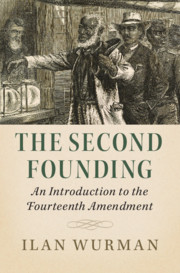Book contents
- The Second Founding
- The Second Founding
- Copyright page
- Dedication
- Contents
- Acknowledgments
- Note on the Cover
- Introduction
- Part I Antebellum Law
- 1 Due Process of Law
- 2 Protection of the Laws
- 3 The Privileges and Immunities of Citizenship
- Part II From Abridgment to War and Ratification
- Part III The Modern Era
- Notes
- Index
1 - Due Process of Law
from Part I - Antebellum Law
Published online by Cambridge University Press: 30 October 2020
- The Second Founding
- The Second Founding
- Copyright page
- Dedication
- Contents
- Acknowledgments
- Note on the Cover
- Introduction
- Part I Antebellum Law
- 1 Due Process of Law
- 2 Protection of the Laws
- 3 The Privileges and Immunities of Citizenship
- Part II From Abridgment to War and Ratification
- Part III The Modern Era
- Notes
- Index
Summary
This chapter surveys the legal history of the term "due process of law," from Magna Carta, the Statutes of Edward III, and the Petition of Right to the writings of William Blackstone and the opinions of antebellum state-level court cases. It argues that there was no concept of "substantive due process" in the antebellum period. It refutes arguments that due process prohibited class legislation, limited states to reasonable exercises of the police powers, or underwent a change in meaning as a result of abolitionist constitutional thinkers.
Keywords
- Type
- Chapter
- Information
- The Second FoundingAn Introduction to the Fourteenth Amendment, pp. 15 - 35Publisher: Cambridge University PressPrint publication year: 2020

